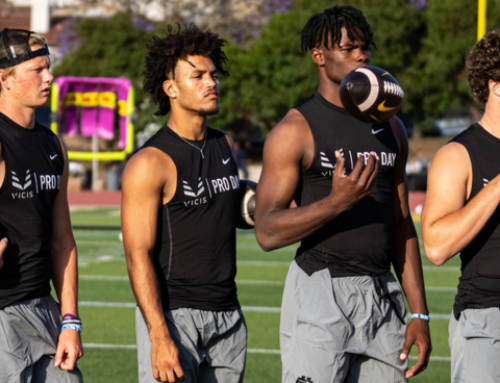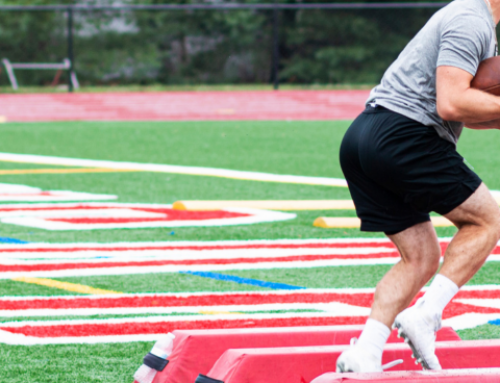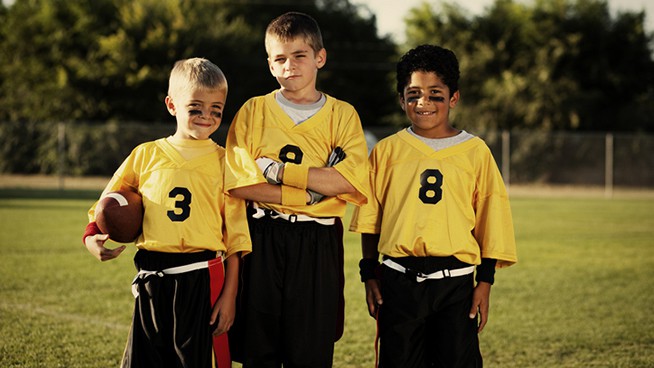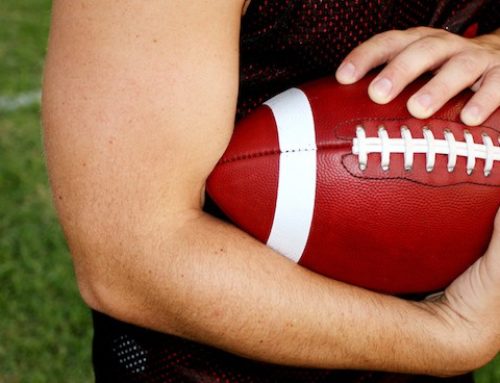As the summer months draw to a close, football players all over the country get ready for Hell Week, the most grueling training period of the season. With intense heat, long practices and bone-rattling hits, the demands on the body are extreme. Here are some tips for getting through it the healthiest way possible.
Hydrate Early and Often
Dehydration can lead to slower reaction times, reduced speed and less strength, as well as more serious health problems like cramps, heat exhaustion and heat stroke.
Two to three hours before practice, drink 17 to 25 ounces of water. Consume another 10 to 15 ounces of water 30 minutes before practice. After practice, drink 16 to 20 ounces of water for every pound of body weight lost.
Weigh yourself right before practice (and after going to the bathroom), then right after practice to determine how much body weight you lost.
Replenish Electrolytes
Excessive sweating robs the body of important minerals called electrolytes—including sodium, chloride, potassium, magnesium and calcium—which help maintain cell hydration and ensure proper nervous system function and muscle contraction. Sodium and chloride particularly need refueling. Great quantities of them are lost when you sweat.
Signs of electrolyte deficiency include dizziness, loss of appetite, irregular heartbeat and muscle cramps. Most people need about 1500 mg of sodium and 2300 mg of chloride a day. You can replace electrolytes with sport drinks, supplements or even common table salt. The saltier you sweat, the more you need electrolyte replacement.
Consume Sufficient Carbohydrates
Carbohydrates are the main source of muscle energy during the short, intense bursts of activity common in football. Just like hydrating, storing carbs in the body needs to begin before practice. The Australian Sports Institute recommends taking in 4 to 6 grams of carbohydrates per pound of body weight per day. In between practices it gets a bit trickier. Another 1 gram per two pounds of body weight is needed to make sure all fuel is absorbed without interfering with your training.
Some carbs digest faster than others and are more efficient at replacing muscle glycogen. It’s important to consume 100 calories of foods that rank high on the glycemic index before practice to ensure you have readily available fuel to power you through high-intensity drills.
After practice, you want to replace carbs as quickly as possible, since Hell Week is a non-stop carousel of physicality. Again, choose foods that rank high on the glycemic index, and consume them within 30 minutes to two hours after a practice.
Replenish Your Muscles With Protein
Proteins are the building blocks of the muscles. During intense physical activity requiring repeated bouts of strength that break down the muscles, protein is critical to help rebuild muscle cells. Football players and athletes in other contact sports like wrestling, MMA and rugby need higher amounts of protein post-training than other athletes. To sustain growth and prevent breakdown, they need .6 to .8 grams of protein per pound of body weight. Growing teen athletes need more protein to accommodate their developmental growth—.6 to 1 gram of protein per pound of body weight.
Read more:
RECOMMENDED FOR YOU
MOST POPULAR
As the summer months draw to a close, football players all over the country get ready for Hell Week, the most grueling training period of the season. With intense heat, long practices and bone-rattling hits, the demands on the body are extreme. Here are some tips for getting through it the healthiest way possible.
Hydrate Early and Often
Dehydration can lead to slower reaction times, reduced speed and less strength, as well as more serious health problems like cramps, heat exhaustion and heat stroke.
Two to three hours before practice, drink 17 to 25 ounces of water. Consume another 10 to 15 ounces of water 30 minutes before practice. After practice, drink 16 to 20 ounces of water for every pound of body weight lost.
Weigh yourself right before practice (and after going to the bathroom), then right after practice to determine how much body weight you lost.
Replenish Electrolytes
Excessive sweating robs the body of important minerals called electrolytes—including sodium, chloride, potassium, magnesium and calcium—which help maintain cell hydration and ensure proper nervous system function and muscle contraction. Sodium and chloride particularly need refueling. Great quantities of them are lost when you sweat.
Signs of electrolyte deficiency include dizziness, loss of appetite, irregular heartbeat and muscle cramps. Most people need about 1500 mg of sodium and 2300 mg of chloride a day. You can replace electrolytes with sport drinks, supplements or even common table salt. The saltier you sweat, the more you need electrolyte replacement.
Consume Sufficient Carbohydrates
Carbohydrates are the main source of muscle energy during the short, intense bursts of activity common in football. Just like hydrating, storing carbs in the body needs to begin before practice. The Australian Sports Institute recommends taking in 4 to 6 grams of carbohydrates per pound of body weight per day. In between practices it gets a bit trickier. Another 1 gram per two pounds of body weight is needed to make sure all fuel is absorbed without interfering with your training.
Some carbs digest faster than others and are more efficient at replacing muscle glycogen. It’s important to consume 100 calories of foods that rank high on the glycemic index before practice to ensure you have readily available fuel to power you through high-intensity drills.
After practice, you want to replace carbs as quickly as possible, since Hell Week is a non-stop carousel of physicality. Again, choose foods that rank high on the glycemic index, and consume them within 30 minutes to two hours after a practice.
Replenish Your Muscles With Protein
Proteins are the building blocks of the muscles. During intense physical activity requiring repeated bouts of strength that break down the muscles, protein is critical to help rebuild muscle cells. Football players and athletes in other contact sports like wrestling, MMA and rugby need higher amounts of protein post-training than other athletes. To sustain growth and prevent breakdown, they need .6 to .8 grams of protein per pound of body weight. Growing teen athletes need more protein to accommodate their developmental growth—.6 to 1 gram of protein per pound of body weight.
Read more:
[cf]skyword_tracking_tag[/cf]












